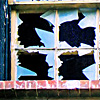Session Overview

|
How do we study particular topics in psychology? How is scientific psychology different from “common sense” or “folk” psychology? This session examines the research methods necessary to develop and test ideas, and highlights how even widely-discussed scientific studies can fall short of the truth. Keywords: scientific experiment, validity, correlation vs. causation, stimulus and response, experimenter bias, confirmation bias, common sense The broken windows theory is a popular, and frequently criticized, causal linking of urban disorder and vandalism to crime rates. (Image courtesy of Grant MacDonald on Flickr.) |
Session Activities
Readings
Read the following before watching the lecture video.
- [Sacks] Chapter 19, “Murder” (pp. 161-165)
- One of the following textbook chapters:
Lecture Videos
View Full Video
View by Chapter
- Psychology and Science
- What Makes Something an Experiment?
- Psychology Experiments and the Real World
- Little Things Can Influence Behavior
- Folk Psychology and Scientific Psychology
Video Resources
Check Yourself
Multiple Choice Questions
Question 1
Which of the following characteristics of experimental design ensure causation when done correctly?
Question 2
Which of the following types of experimental validity refers to results of a specific experiment that can be generalized to other contexts?
Question 3
What type of design prevents biased results due to either the researcher or the participants?
Short Essay
When conducting psychological research there are three main research designs that researchers use. All three research designs can collect, analyze and interpret data, but each have important differences. Name and describe each of the three research designs. Describe the advantages and disadvantages of each design. Give a research example of each design.
› Sample Answer
The three research designs are descriptive research, correlational research, and experimental research.
Descriptive research provides a description or snapshot of the current state of affairs or some phenomenon in order to understand the nature of that phenomenon. Advantages of descriptive research is that it provides a complete picture of the situation and is often real world or events that are naturally occurring. Disadvantages are that there is no statistical relationship, beyond anecdotal evidence, that are studied; causal influence cannot be inferred, and it is difficult to determine which variables are influential in the study due to the inability to repeatedly measure all of the variables and to even know what all of the variables are.
Correlational research tests relationship between two or more variables. Advantages of correlational research are statistical tests to show the relationship is unlikely to occur due to chance, the ability to make predictions about future outcomes, and it can be used to assess real-world events. The main disadvantage is that no causal relationship can be inferred from the relationship of the variables.
Experimental research is used to asses the causal relationship between two or more variables by manipulating independent variables and testing the causal impact on a dependent variable. While it is more difficult to assess real-world events, experimental research has all of the other advantages of correlational research in addition to the ability for causal inference. Disadvantages are the difficulty to manipulate important variables or many variables at one time and the cost of conducting experiments.
Further Study
These optional resources are provided for students that wish to explore this topic more fully.
| TYPE | CONTENT | CONTEXT |
|---|---|---|
| Video | “Correlation and Causation.” Kahn Academy. | Good background on this fundamental concept in scientfic research |
| Blog | Bad Science | Dr. Ben Goldacre, epidemiolgist and columnist for the Guardian UK, examines “bad science [as the] best way to explain good science.” |
| Blog | Neuroskeptic | “A neuroscientist takes a skeptical look at his own field, and beyond.” |
| Web activity | Research Methods: From Question to Conclusion. Discovering Psychology. WGBH Educational Foundation, 2001. | Interactive quiz about how psychological research is conducted. |
| Textbook supplement | Study materials for Chapter 1, “Psychology: Yesterday and Today.” In Kosslyn & Rosenberg, Psychology in Context, 3/e (Pearson, 2007) | Practice test questions, flashcards, and media for a related textbook |










